Won the Attention Battle: Duolingo's Secret to Captivating 600 Million Users
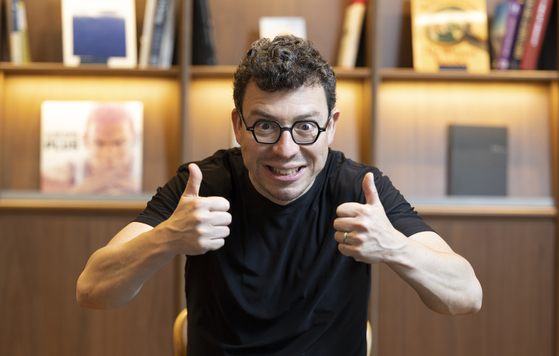
Duolingo founder Luis von Ahn poses for a photo during an interview with the JoongAng Ilbo, an affiliate of the Korea JoongAng Daily, at Episode Yongsan in Yongsan District, central Seoul, on April 11. [LIM HYUN-DONG]
Education apps are locked in an “attention war” with social media, and the only way to win is to make language learning as fun and addictive as TikTok or Instagram, Duolingo founder Luis von Ahn believes.
“Our real competitors are social media, like TikTok and Instagram,” von Ahn said during an interview with the JoongAng Ilbo, an affiliate of the Korea JoongAng Daily.
As people spend more time on social media, language learning and education apps need to compete for that time, von Ahn said. To occupy users’ limited days, education apps also need to be fun to survive.
“Generally, what we want to do is we want to make sure that we can teach all the important subjects in a way that is accessible to everyone, so in a way that is free to everyone,” he said. “Ultimately, we want that when people use their phone, some of that time is used for productive purposes and not just scrolling TikTok.”
Originally from Guatemala, von Ahn immigrated to the United States in 1996 to attend college. Later, while working on his Ph.D. at Carnegie Mellon University, he developed Captcha and reCaptcha, technologies that distinguish people from bots on websites
He sold this technology to Google in 2009 and became a billionaire. Two years later, in 2011, he founded Duolingo and achieved great success once again.
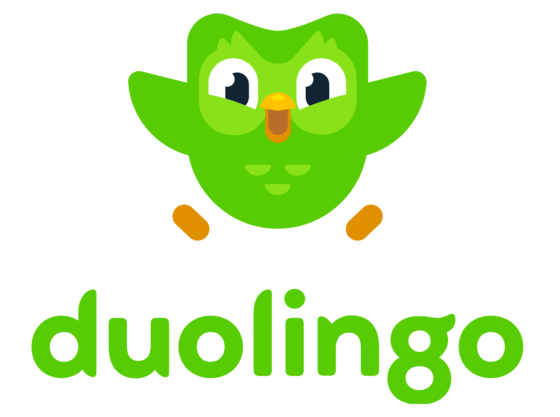
[DUOLINGO]
Currently, Duolingo is the world’s largest foreign language education app with more than 600 million users worldwide.
The monthly active users are estimated at about 116.7 million. Users can learn 40 languages, including Korean, English, Spanish, Arabic and even Irish and Hawaiian, which are endangered.
The following interview has been edited for length and clarity.
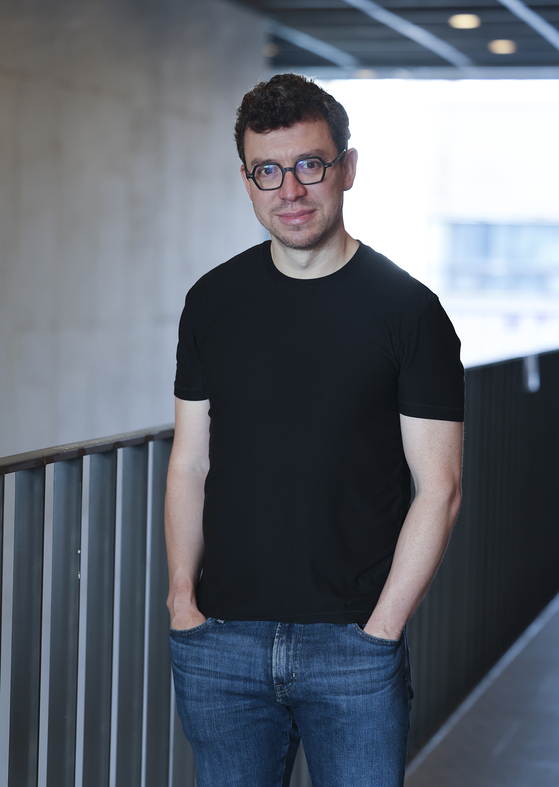
Duolingo founder Luis von Ahn poses for a photo during an interview with the JoongAng Ilbo, an affiliate of the Korea JoongAng Daily, at Episode Yongsan in Yongsan District, central Seoul, on April 11. [LIM HYUN-DONG]
Why did you create a free language leaning app?
The most important thing for us at Duolingo is really to have everybody have access to education. You know, in most countries in the world, two things are true. First of all, knowledge of English helps you make more money, and secondly, if you have more money, you have access to better education. We want to change that — we want to make it so that everybody has access to the equal levels of education. This is why we made the app free.
Most of your services are free, so how can you run it as a business?
There are three tiers for users. There's the free version. You can learn as much as you want in the free version, but at the end of a lesson you have to see an ad. If you don't want to see ads, you can do Super Duolingo, which is the middle tier that turns off ads. Duolingo Max is the highest tier that also turns off ads, but in addition to that, it gives you access to this video call feature, which allows you to practice conversation.
I actually don't think [providing the services for free and making a business] are at odds. The reality is that the fact that the app is free has allowed us to grow so much. I mean, the way Duolingo grows — we don't have big marketing budgets. If you see, for example, here in Korea, you're not going to see us on big billboards or on the sides of buses or anything.
The way we grow is that people download the app, they use it for free and then they tell their friends. Some of these friends are going to pay to subscribe, about 8 to 10 percent. But the reality is that the free version, not only is it good for our mission which is getting as much education as possible in the hands of everybody, but it is what has allowed us to grow without having to spend billions of dollars on marketing.
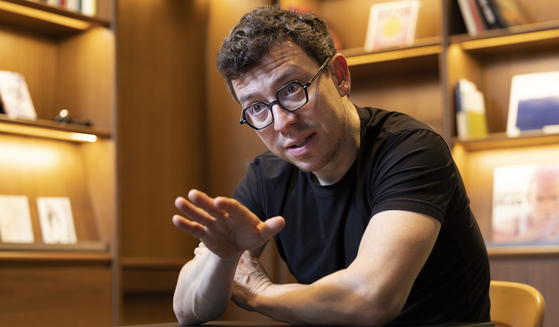
Duolingo founder Luis von Ahn speaks during an interview with the JoongAng Ilbo, an affiliate of the Korea JoongAng Daily, at Episode Yongsan in Yongsan District, central Seoul, on April 11. [LIM HYUN-DONG]
What is the secret to Duolingo’s success?
We spend a lot of effort making the app as easy to use as possible and also as enjoyable as possible. So using Duolingo to learn feels a lot like a game, and you know we've spent the last 14 years making Duolingo more and more enjoyable. We use a lot of psychological techniques to get people to continue using Duolingo, the street being one, of them our notifications being another one. You know you get points whenever you do things. So in general you know we've been able to attract more than 100 million people to continue using it.
What is the role of AI in language learning apps like Duolingo?
We have used AI ever since we started doing so 14 years ago — we've used different forms of AI. The idea has always been that it's going to be a computer that teaches you as opposed to a human that teaches you. The reason for that is because we think that computers are it's a lot more scalable to have computers teach everywhere in the world rather than teachers.
Over time we have just become more sophisticated at it. So for example the content that was served used to be made half by humans half by AI. By now it's entirely done by AI. In general, the main thing that AI has helped us is making the content faster and also in being able to practice real time conversation, because we now have a feature called video call where you have you practice real time conversation with an AI as opposed to with a human. We've never had real time conversation with a human, because most people don't want to talk to another human, because they feel too shy, but we're now able to do it by having you talk to an AI.
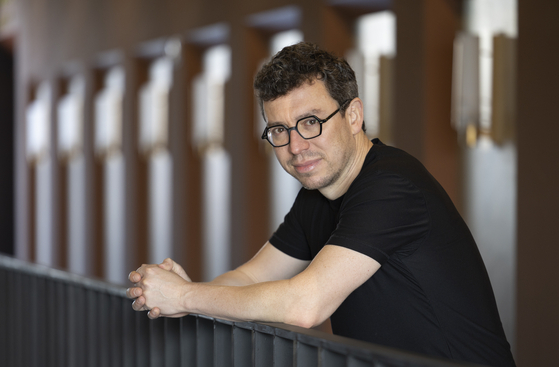
Duolingo founder Luis von Ahn poses for a photo during an interview with the JoongAng Ilbo, an affiliate of the Korea JoongAng Daily, at Episode Yongsan in Yongsan District, central Seoul, on April 11. [LIM HYUN-DONG]
What brought you to Korea this time?
Korean is [one of the] fastest growing languages in terms of learning. We know more people are learning Korean than Chinese, which I find incredible. And it has a lot to do with the fact that Korean is only spoken in one country, but Korea has a very big influence throughout the world with things like K-pop and K-dramas. We have three tiers of languages. English is its own tier, it's the most important language. Then we have the next tier, which are the top eight largest languages that we teach. Korean is one of them. But it's also French, Spanish, Chinese, Japanese, Italian, German and Portuguese. So that next tier we spend a lot of effort, and then there's the tier after that, those are languages that not many people want to learn.
BY MOON SANG-HYEOK [lim.jeongwon@joongang.co.kr]
Post a Comment for "Won the Attention Battle: Duolingo's Secret to Captivating 600 Million Users"
Post a Comment